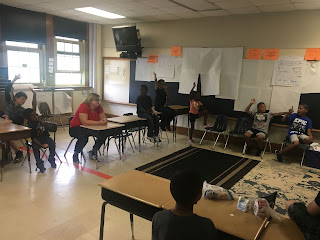Literacy Empowers All People – or LEAP – was born when Le
Moyne College education students Becca Gray and Maggie Donohue traveled to the
Lower Ninth Ward of New Orleans to help rebuild after Katrina. As education students, they saw needs beyond
the rebuilding of homes, as important as that is. They both volunteered in an afterschool
program and saw that the storm, combined with poverty, had created enormous
educational deficits for the children in the Lower Nine. The decision was made to offer literacy
education over the summer – and LEAP began.
The first summer, we worked with 52 children in the Lower
Nine for one week. Now, our program,
which combines progressive education with an anti-racist curriculum, serves over
100 children every summer. This year, we
are offering a 4 week problem-based learning program that draws on literature
and music, art and ingenuity to help students address problems of their own
choosing.
And LEAP is growing elsewhere. We plan on bringing our program back home to
Syracuse – again addressing children who live in poverty and do not have the
resources that other students have.
Living in poverty can lead to poor nutrition, increased stress in the
home, health issues and a lack of educational resources (such as books and
computers) in the home. And all of those
effects lead to poor educational attainment.
Children who live in poverty have only 45% of the vocabulary of a child
who is raised in a middle-class home.
These struggling readers will then have extra challenges in all subjects
– where the text book may be incomprehensible.
Even the instructions for homework can be a challenge to read.
So LEAP reaches out to these children. We strive to show them that they are smart,
they have something to say, and they can find ways to say it through
literacy. We provide fun, stimulating
educational experiences that will, hopefully, show these wonderful children
that the extra hard work that they will have to put into their education is
worth it.
All of this, of course, takes money. We provide children with books they can take
home with them when the program is over, we use craft supplies and journals and
pencils, pens and crayons. Your support
can really make a difference for a child who, through only the accident of
where they were born, has to work twice as hard to get a high school diploma or
college degree as other children. Please
consider donating. We’re getting ready
to launch this summer’s program and will immediately put your gift to good use. (You’ll see a Donate Now! link above.)
